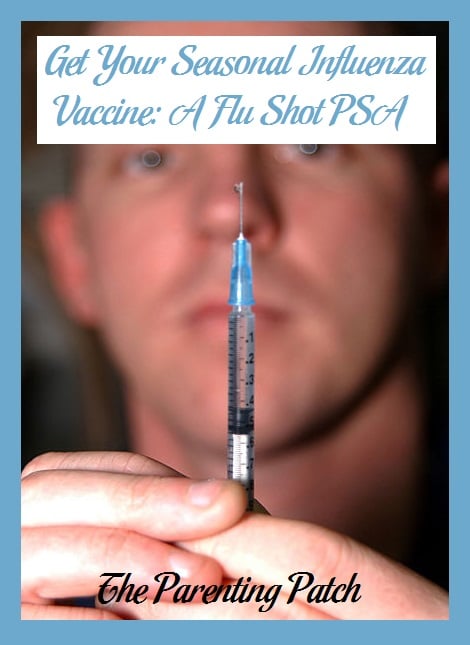Have you received your yearly flu shot yet? My husband, my daughter, and I all got our seasonal influenza vaccines yesterday. Like clockwork, my husband and I get our flu shots every year. Because I have asthma, I am in a high risk category for complications from the flu. Thus, I have been getting a flu shot each year since I was seven years old. Because he wants to help protect me, my husband has also been getting a flu shot each year since he met me.
My daughter, who is also in a high risk group because of her young age, will also be getting a flu shot every fall. A recent statement released by the American Academy of Pediatrics (AAP) urges parents to vaccinate all children under the age of two as well as urges other individuals within higher risk categories to receive the seasonal influenza vaccine:
“According to the AAP, special efforts should be made to vaccinate people in the following groups: children who have chronic medical conditions that increase their risk of influenza complications, like asthma, diabetes, immunosuppression, or neurologic disorders; family members and others who are in contact with children with high-risk conditions and children under age 5 (especially children under 6 months of age); all health care personnel; and women who are pregnant, are considering pregnancy, have just delivered or are breast-feeding during influenza season.”
Because she is so young, my daughter received her first flu shot yesterday along with her father and me. She will get her second dose in a month. According to the Centers for Disease Control and Prevention (CDC), children who are being vaccinated against the seasonal flu for the first time will need two doses of the vaccine. As the CDC explains:
“The first dose should be given as soon as vaccine becomes available. The second dose should be given at least 28 days after the first dose. The first dose ‘primes’ the immune system; the second dose provides immune protection. Children who only get one dose but need two doses can have reduced or no protection from a single dose of flu vaccine.”
Why is getting the flu shot each year so important? First, the World Health Organization (WHO) provides the following facts about the seasonal flu:
- Influenza is an acute viral infection that spreads easily from person to person.
- Influenza circulates worldwide and can affect anybody in any age group.
- Influenza causes annual epidemics that peak during winter in temperate regions.
- Influenza is a serious public health problem that causes severe illnesses and deaths for higher risk populations.
- An epidemic can take an economic toll through lost workforce productivity, and strain health services.
Additionally, the seasonal influenza is “characterized by a sudden onset of high fever, cough (usually dry), headache, muscle and joint pain, severe malaise (feeling unwell), sore throat, and runny nose.” Although most individuals recover from the flu within a week without requiring medical attention, the disease can cause severe illness or death in high risk individuals. High risk individuals include nursing-home residents (the elderly or disabled); elderly individuals; people with chronic medical conditions such as asthma; and other groups such as pregnant women, health care workers, those with essential functions in society, and children from ages six months to two years.
Second, as WHO also explains, the influenza vaccine is the “most effective way to prevent infection.” Among healthy adults, the flu shot can prevent 70% to 90% of influenza-specific illness. Among the elderly, the flu shot reduces severe illnesses and complications by up to 60%, and deaths by 80%. Flu shots are also important for children. In 2009, 282 children died as a result of the flu. In 2010, 122 pediatric flu deaths occurred. Last year, 34 children died because of the seasonal influenza. Even more children were hospitalized as a result of the flu. Getting a yearly flu shot cannot prevent the flu entirely, but being vaccinated against seasonal influenza does lower the chances of contracting the potentially fatal and highly preventable illness.
To help prevent the spread of the seasonal influenza, do your part today. Get yourself and your family vaccinated. Your life and the lives of your loved ones, friends, neighbors, and even strangers you pass on the street could depend on the flu shot.
References
AAP updates recommendations for flu vaccine: http://www.aap.org/en-us/about-the-aap/aap-press-room/pages/AAP-Updates-Recommendations-for-Flu-Vaccine.aspx
Children, the flu, and the flu vaccine: http://www.cdc.gov/flu/protect/children.htm
FluView: http://www.cdc.gov/flu/weekly/
Influenza (Seasonal): http://www.who.int/mediacentre/factsheets/fs211/en/index.html
Image Credits
Get Your Seasonal Influenza Vaccine: A Flu Shot PSA: http://commons.wikimedia.org/wiki/File:US_Navy_021019-N-9593M-007_Flu_shot_preparations.jpg




